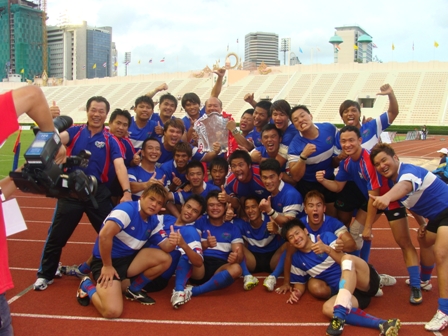
Publication Date:10/21/2011
Source: Taiwan Today
By John Wren
The eyes of the sporting world will be on New Zealand Oct. 23 as the rugby-obsessed nation gears up to host the final of the World Cup. Last staged in the land of the long white cloud in 1987, the tournament is poised to be a rerun of the inaugural edition, with hometown favorites the All Blacks going up against the mercurial French before a sell-out crowd of 60,000 at Eden Park in Auckland.
Although one of the world’s top five sporting events, the World Cup is not yet a highlight on Taiwan’s sporting calendar. This is evidenced by the distinct lack of outrage on the part of fans denied free-to-air coverage of the 45-day tournament due to a brouhaha between local networks and the International Rugby Board over broadcasting fees.
With games being beamed to a record cumulative global audience of over 4 billion in 238 countries, it seems more than a little odd that Taiwan should be blacked out. Even fans in reclusive North Korea have theoretically been able to watch all 48 matches live on ESPN Star Sports.
But an absence of rugby from terrestrial TV in Taiwan does not mean there is zero interest in the sport on the island. In fact, the country’s 1,700 registered male and female players comprise a growing number of enthusiasts and supporters who are daring to dream big when it comes to taking part in the competition.
Of course, these visions of sporting grandeur do not extend to such lofty heights as hoisting rugby’s “Holy Grail,” the gold-plated solid silver William Webb Ellis Cup; rather, they center on earning the right to lock horns with 19 other nations every four years and showing the world that Taiwan is more than a high-tech haven where baseball and golf rule OK.
For the Chinese Taipei Rugby Union, the sport’s governing body on the island, an important step in achieving this goal was taken May 9 when Taiwan defeated Thailand 22-10 to gain promotion to the HSBC Asian Five Nations Division One for 2012. The gripping match, played in front of a vociferous crowd at Bangkok’s National Stadium, was one of intense physicality and commitment, decided only in the closing stages when lock Lee Chun-wen and then flanker Chen Kuo-luo muscled their way over for tries to break the 10-10 deadlock.
This victory means that Taiwan will do battle with Singapore, Sri Lanka, Malaysia and the Philippines next year in an attempt to earn promotion to the all-important top tier of the Five Nations. This would be a boon for the country’s World Cup hopes as the winner automatically qualifies for the tournament, with the runner-up contesting a play-off series involving second-place teams from the African, Americas and European regions.
Admittedly, Taiwan has some work to do before it reaches this stage of the game, but there is no doubt it is heading in the right direction under coach Chen Liang-chien’s youth-first policy. The extremely young and inexperienced squad that was relegated from Division One in 2010 learnt some invaluable lessons from the experience, and is giving every sign of being ready to lay down a serious challenge for promotion in the next few years.
Normally, the road to World Cup qualification would be a difficult one for Taiwan. Since the Five Nations commenced in 2009, Japan has never failed to clinch top spot, and this year easily beat Hong Kong, Kazakhstan, Sri Lanka and the United Arab Emirates to be Asia’s sole qualifier. Unless the Brave Blossoms suffer a sea change in form, they are again on course to represent the region in the 2015 tournament, which is taking place in England from Sept. 4 to Oct. 15.
But things get interesting in 2019 when the World Cup moves to Japan. As hosts, the country automatically qualifies, leaving the Asia spot wide open for one of the region’s rugby minnows to appear for the first time. For a Taiwan side that will have played together for the better part of a decade, this is a once-in-a-lifetime opportunity where qualification, with the help of the rugby gods, can be realistically achieved.
Naysayers may shrug this talk off as the kind of chatter best saved for the rugby clubhouse during boozy post-match revelries, but they would be wrong. Ivory Coast, Spain and Portugal also came from nowhere to qualify for the World Cup in 1995, 1999 and 2007, respectively, going on to capture sporting headlines and earn national respect that cannot be bought with trade deals and aid packages.
Games involving these countries will live long in the memory of fans for the courage and class displayed by the players as they girded themselves for battle and set about taking on some of the world’s rugby powerhouses. Not surprisingly, many of the scorelines left a lot to be desired, but this did not diminish the spectacle nor in any way undermine the worth of the contests as highly visible platforms for promoting these countries and their societies’ values.
If Taiwan qualifies for the 2019 Rugby World Cup, no one expects the country to win a game or even score more than a handful of points. Yet to participate in this event would do more for the island’s image than nearly 40 years of ROC government-funded PR campaigns and fruitless appeals to the U.N. for recognition. When it comes to international sport, everyone loves a winner but those who put up a good fight are never forgotten.
John Wren is a freelance writer based in Keelung. These views are the author’s and not necessarily those of Taiwan Today. Copyright © 2011 by John Wren
Write to Taiwan Today at ttonline@mail.gio.gov.tw
http://taiwantoday.tw/ct.asp?xItem=178433&ctNode=449&mp=9